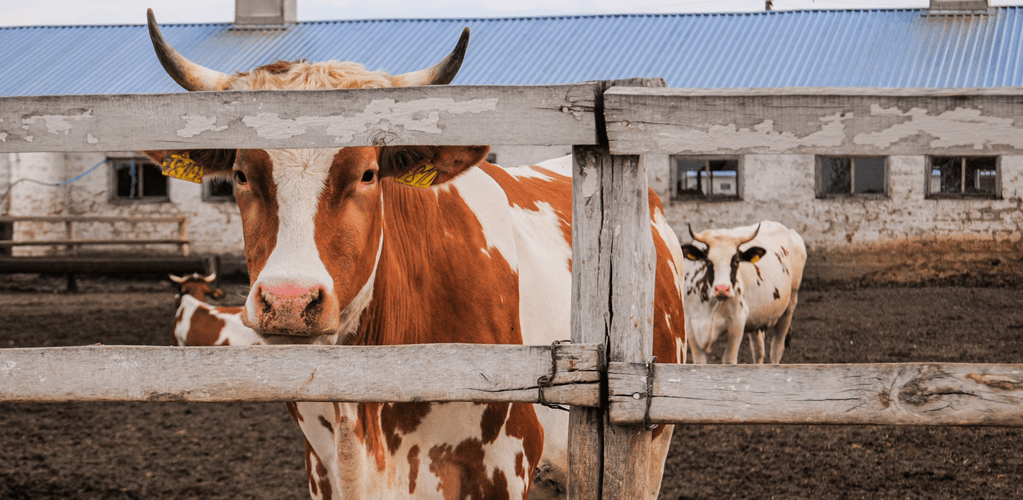World’s biggest meat and dairy companies spend more on ads than cutting emissions
Despite being major polluters, global meat and dairy companies invest minimally in emission reduction, spending more on marketing and lobbying. Their climate targets are often misleading, failing to meet UN guidelines.

TL;DR | Highlights from this story
● Global meat and dairy corporations prioritize advertising over investing in low-carbon solutions, despite significant emissions.
● The livestock industry, major emitter, faces scrutiny over rising emissions linked to meat consumption and deforestation.
● Analysis shows companies’ climate targets fall short of UN guidelines, with advertising budgets exceeding sustainability investments.
● The meat and dairy industry uses political leverage to avoid stringent climate laws, weakening regulatory measures.
G lobal meat and dairy giants are investing just a fraction of their revenues into cutting emissions despite being among the world’s largest polluters, according to new estimates.
Company spending on advertising outstripped that on low-carbon solutions, the report by campaign group Changing Markets Foundation found, as corporations ramped up attempts to win consumers over with their green credentials.
The meat and dairy sector – responsible for over 14% of global greenhouse gas emissions – has come under increasing pressure in recent years to tackle major climate harms.
The New Merchants of Doubt, published on Thursday, examines the climate targets, lobbying records and advertising campaigns of 22 of the largest livestock companies, through case studies in the U.S., the UK, the EU, Australia, New Zealand, Italy, and Brazil.
Cows emit large amounts of greenhouse gas emissions through their burps and farts – and the expansion of the livestock sector is driving rising emissions as meat consumption grows. Meat and dairy companies have also been linked to deforestation of the Amazon and other vital carbon sinks, where vast swathes of forest have been cut down for ranching or to allow the production of soy exported for animal feed.
None of the companies in the report had targets to cut emissions that aligned with guidance from UN experts.
The report found that the sector failed to take action on tackling emissions, while also spending millions on marketing sustainability claims. Companies have seen a spate of greenwashing allegations in recent years, with multiple firms forced to pull misleading ads – including Brazilian meat giant JBS, which last year was ordered by the U.S. advertising watchdog to stop making “net zero” claims.
Industry campaigns were strongly geared towards younger Gen Z consumers, including through TikTok and YouTube partnerships, and school education programmes, the report found.
Researchers contrasted this green marketing to the livestock sector’s lobbying behind the scenes. Companies and their trade groups had opposed nature-friendly laws in multiple countries, the report noted, including attempts to curb methane, a potent greenhouse gas.
The report “exposes the blatant hypocrisy of Big Meat and Dairy”, said Nusa Urbancic, CEO of Changing Markets Foundation.
“They claim to be committed to climate solutions while employing deceptive tactics to distract, delay and derail meaningful action. These tactics mirror those of Big Oil and Big Tobacco, allowing them to continue their harmful practices unchecked.”

— A farm in Belo Horizonte, Brazil.
‘Greenwashing’
While the majority of companies analysed have promoted efforts to reach net zero and carbon neutrality, most do not declare how much they plan to invest in cutting emissions.
The report’s analysis of publicly available data found that companies spent just 1% of their revenue on research and development (R&D) – an area that includes spending on improving sustainability.
In numerous cases – where spending information was available – companies paid more for advertising than their efforts to decarbonise.
JBS, the world’s largest meat company, invested just 0.03% of annual revenues into climate measures, the estimate suggests – equivalent to around 6% of its total advertising spend. Meanwhile dairy giants Fonterra, Nestlé, and Arla all spent more on advertising than on research and development of low-carbon solutions, according to the report.
Nestlé – whose 87.5 million tonnes of emissions are similar to those of Chile – spent 14 times more on “marketing and administration” in the last year than it did on “regenerative agriculture” (the company’s headline sustainability spending pledge) for the past five years, the report found.
“Regenerative agriculture”, which includes organic and no-till farming, has been widely touted by livestock companies as a solution to their rising emissions. However, the nonprofit research organisation World Resources Institute found that while good for the environment, it has “limited potential” to mitigate climate change.
Fonterra’s director of sustainability, Charlotte Rutherford, said the figures in the report did not accurately reflect the organisation’s investment into sustainability, and that “it only covers outdated capital investment, rather than the significant investment we have made across the Co-op”.
She added that Fonterra had a “large team of sustainability experts” and “was working constructively with industry and government to ensure emissions reduction strategies can deliver”.
A spokesperson for Nestlé said the company was investing and delivering on their “net zero roadmap”, and that the company was on track to cut agricultural emissions in its supply chain by 50% by 2030.
“We continue to ramp up our climate efforts using world-class R&D, including via the Nestlé Institute for Agricultural Sciences,” they said in an emailed statement. “We also advocate for the right enabling policy environment to speed up decarbonization in agriculture at scale, and provide transparent reporting on our activities.”

— A farm in Urubici, State of Santa Catarina, Brazil.
The other companies and groups referenced in this article were all contacted for comment, but had not responded prior to publication.
The report also found that companies’ large marketing budgets had sometimes been used to mislead consumers through greenwashing claims.
Companies did this through vague and misleading statements on product packaging, for example. Danish dairy company Arla has marketed its cheddar as “building a sustainable future”, despite the company not having climate targets aligned with 1.5C, the report found.
JBS, the world’s biggest meat producer, is currently being sued by New York’s Attorney General, Letitia James, over allegations that it has misled consumers about its climate commitments.
The company has said that it disagrees with the attorney general’s characterisation of its commitments to sustainability.
The Changing Markets Foundation report also found that the meat and dairy industry had targeted younger audiences through tailored campaigns on social media and online collaborations with influencers, gamers, and popular sports figures.
Gen Z – which describes those currently aged between 14 and 27 years old – is generally seen as more concerned about the environment, climate change and animal welfare, and therefore likely to move towards lower-carbon diets.
The report gave one example of a collaboration between industry group Dairy Farmers of America and the U.S.-based YouTube influencer Sean Evans, who teamed up in 2022 as part of a major marketing campaign.
Evans – host of First We Feast’s “Hot Ones”, which features celebs eating spicy chicken wings – made a sponsored video for his 13.6 million subscribers, promoting milk as a safeguard against spicy food and “also [to] help keep the planet from getting too hot”.

— A farm in Brasil.
Inadequate Climate Targets
Though 15 of the 22 companies analysed had published or were working towards setting climate targets, the report found that these did not align with expert advice.
The UN published guidance on setting meaningful targets in 2022 ahead of COP27, in response to fears that inadequate targets could contribute to greenwashing. The report found that none of the companies analysed complied with the recommendations – which include calls for measures to apply throughout supply chains and see overall reductions in emissions.
Inadequate targets can fuel “a culture of climate misinformation and confusion”, the UN Secretary General stated in January 2023.
The livestock industry is responsible for over 30% of global methane emissions – a greenhouse gas that has a global warming potential 80 times higher than that of carbon dioxide over a 20 year period.
However, of the companies analysed, only dairy giant Danone had set a methane target – another key recommendation by the UN.

— Global methane emissions have increased dramatically in the last two decades.
The report found that meat and dairy companies had repeatedly underplayed the role of the sector in methane emissions, for example misleadingly claiming that their methane emissions were a natural part of the carbon cycle and therefore absorbed by vegetation. Such claims ignore the significant short-term warming caused by the industry’s methane emissions.
Some companies produce huge amounts of the greenhouse gas, among them JBS, whose methane output increased by 6% between 2022 and 2023.
Lobbying and Revolving Doors
The sector has so far largely avoided legislation to curb its climate harms. The report found that the industry had instead used “extraordinary political access” to push back against nature-friendly laws.
Meat and dairy companies held over 600 meetings with top decision-makers at the European Commission in the last decade, the analysis showed. In the U.S., revolving doors were shown to be in full swing. The report highlighted how Secretary of Agriculture Tom Vilsack previously worked as the president of the US Dairy Export Council – following another previous stint as Secretary of Agriculture under former U.S. President Barack Obama.
The sector also secured a massive win in the Inflation Reduction Act, the flagship U.S. climate policy. The 2022 act provided billions in funding for emissions cuts, but – in the wake of lobbying from firms including Cargill and Nestlé – failed to regulate the agricultural industry.
“The livestock sector has incredible access to the highest political level,” said Nusa Urbancic of Changing Markets Foundation.
“It is shamelessly using this to set the political agenda and even define the realm of what is possible when it comes to environmental regulation.
“As the main players in the sector are very anti-regulation, we end up with the weakest possible approach: all carrots and no stick.”

GOING FURTHER
The New Merchants of Doubt | Changing Markets Foundation
Integrity matters: Net zero commitments by businesses, financial institutions, cities and regions | United Nations
JBS, Environmental Damage | Wikipedia
JBS
Sources:
▪ This piece was first published in Desmog and re-published in PUBLIC SQUARE UK on 25 July 2024 under a Creative Commons Attribution-NonCommercial 4.0 International licence. | The author writes in a personal capacity.
▪ Cover: Unsplash/Olena Somak_ua. (Licensed under a Creative Commons Attribution-ShareAlike 4.0 International License.)







[Read our Comments Guidelines]